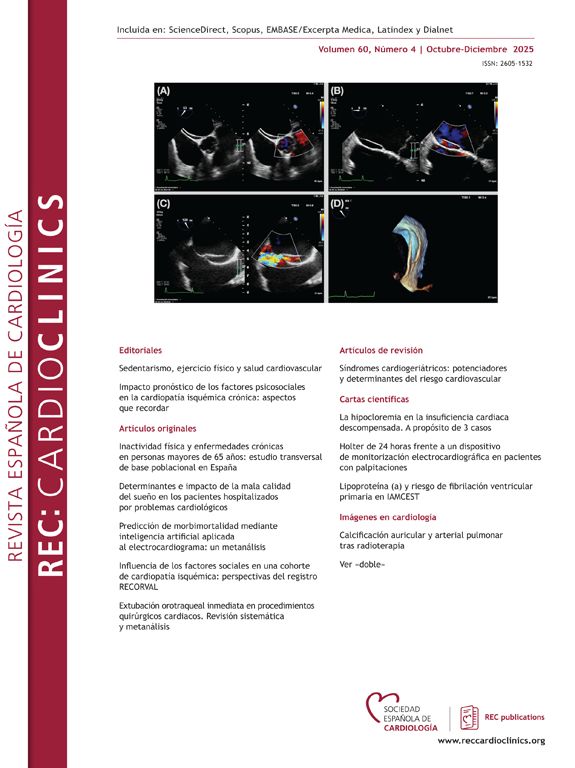El tabaquismo es un factor de riesgo para la enfermedad cardiovascular (ECV). Aunque el cese tabáquico es clave en la prevención secundaria cardiovascular, el uso de citisina como terapia farmacológica sigue siendo limitado en los pacientes con ECV por falta de evidencia específica. El objetivo de este estudio fue evaluar la eficacia y el perfil de seguridad de la citisina en los pacientes con ECV estable, al menos 30 días después de un síndrome coronario agudo.
MétodosSe realizó un estudio observacional prospectivo en un centro hospitalario de nivel terciario entre 2022 y 2024. Se incluyó a 80 pacientes de forma consecutiva con ECV estable al menos 30 días después del síndrome coronario agudo, fumadores activos y con intención de cesación, que recibieron citisina durante 25 días. Se evaluó el cese tabáquico mediante entrevista clínica a un mes y seguimiento telefónico a largo plazo. Se registraron los efectos adversos.
ResultadosA los 30 días del inicio del tratamiento, el 62,5% de los pacientes había cesado el consumo de tabaco; a los 15 meses, el 52,5% mantenía la abstinencia. Se registraron efectos adversos en el 7,5% de los pacientes, en su mayoría leves. Se observaron 2 eventos graves, no atribuibles directamente al tratamiento.
ConclusionesLa citisina mostró una eficacia y seguridad prometedoras en los pacientes con ECV estable. Estos hallazgos apoyan su uso como herramienta terapéutica en programas de cesación tabáquica, aunque se requieren estudios adicionales más robustos.
Smoking is a major risk factor for cardiovascular disease (CVD). Although smoking cessation is key in secondary cardiovascular prevention, the use of cytisine as a pharmacological aid remains limited in CVD patients due to a lack of specific evidence. This study aimed to assess the efficacy and safety profile of cytisine in patients with stable CVD, at least 30 days after an acute coronary syndrome.
MethodsA prospective observational study was conducted at between 2022 and 2024 in a tertiary-level hospital. 80 consecutive patients with stable CVD at least 30 days post- acute coronary syndrome, active smokers with a willingness to quit, were treated with cytisine for 25 days. Smoking cessation was assessed through a clinical interview at 1 month and long-term follow-up via telephone. Adverse events were recorded.
ResultsAt 30 days, 62.5% of patients had quit smoking; at 15 months, 52.5% remained abstinent. Adverse events were reported in 7.5% of participants, mostly mild. Two serious adverse events occurred but were not directly attributable to the treatment.
ConclusionsCytisine demonstrated promising efficacy and safety in patients with stable CVD. These findings support its potential role as a therapeutic tool in smoking cessation programmes, although further robust studies are warranted.
Article
Use datos de acceso a SEC en el menú Acceder.
Si es socio de la Sociedad Española de Cardiología y no puede acceder con sus claves, escriba a rec@cardioclinics.org.
Use the Society's website login and password here.
If you are member of SEC and you have some problems with your login data, please contact with rec@cardioclinics.org.














